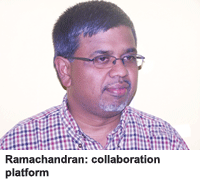With complaints that the overwhelming majority of 3.5 million graduates churned out annually by India’s 509 universities and 31,000 colleges are nowhere near industry ready growing louder by the day, in a renewed attempt to address the growing mismatch between college education and needs of India Inc, on January 18 the Confederation of Indian Industry (CII) southern region (membership: 1,400 member-corporates and 100 colleges), launched an online portal titled Employability Bridge (EB) in partnership with Chennai-based SurgeForth Technologies Pvt Ltd, a workforce management solutions company. The objective of this online portal (www.employability-bridge.com) is to provide a common platform for corporates, and government and private arts, science, engineering and management colleges. Additionally, EB provides industry-driven employability training to students, a placement management system for academia and cost-effective placement aggregation services for industry for on-and-off campus recruitment.
“We conducted a eight-month research study to identify gaps in the curriculum of several study programmes vis-à-vis industry requirements. The study found that the curriculum in all study streams is obsolete and that faculty rarely updates its knowledge base. Students are imparted bookish and theoretical knowledge with very little practical exposure to new industry practices and hands-on training. We decided to address the problem by connecting students, academic institutions and industry online so that institutions under-stand the expectations of industry, students acquire the requisite skills, and industry is able to monitor competence of students and hire the right person for the right job. A nominal subscription fee is paid by CII, institutions and students to access EB. This initiative is expected to benefit 2,000 students from 15 colleges, and 50 companies this year,” says Madhu Vasanthi, director and head of the Tamil Nadu region, CII.
 Some distinguishing features of EB include skills training comprising e-learning and classroom modules, self-assessment tools, internships, project assignments and job opportunities in member companies, and employability skills assessment and certification by Chennai-based Assess People Pvt. Ltd, an independent assessment partner in EB. Students are also offered 60 hours of classroom training in soft skills, business communication and job interview preparation, and 40 hours of training in domain skills at Rs.4,000-6,000. Companies can recruit candidates from a large pool of validated students whose e-profiles are posted online, in lesser time and at lower cost.
Some distinguishing features of EB include skills training comprising e-learning and classroom modules, self-assessment tools, internships, project assignments and job opportunities in member companies, and employability skills assessment and certification by Chennai-based Assess People Pvt. Ltd, an independent assessment partner in EB. Students are also offered 60 hours of classroom training in soft skills, business communication and job interview preparation, and 40 hours of training in domain skills at Rs.4,000-6,000. Companies can recruit candidates from a large pool of validated students whose e-profiles are posted online, in lesser time and at lower cost.
“Our target group is mainly students from colleges in tier II and III towns who may have good analytical skills but are not exposed to industry practices. We are also in talks with government education departments in the southern states to identify areas where we can employ the industry-academia collabo-ration platform,” says Ambalavanan Ramachandran, director SurgeForth Technologies.
This skills upgradation initiative has the enthusiastic cooperation of CII because Indian industry — especially in manufacturing and new technology hubs such as Chennai — is experien-cing an acute shortage of adequately trained professionals which is affecting profit margins in the IT, manufacturing, retail and services industries. Studies conducted by management consulting and skills assessment companies have confirmed their worst fears.
In its latest report released in October 2009, the National Association of Software and Services Companies (Nasscom) indicates that Indian IT firms reject 90 percent of college graduates and 75 percent of engineers who apply for jobs because they are not fit even for training. According to Nasscom, the dearth of competent graduates has compelled multinationals such as Infosys Techno-logies to increase employee training to 29 weeks from this year.
According to another study by McKinsey & Company in 2009, only 25 percent of engineering graduates, 15 percent of finance and accounting professionals and 10 percent of professionals with other degrees are suitable for working in multinational companies. The study predicts that the manufacturing sector will also require a staggering 73 million trained factory workers by 2015. Management talent too is hard to come by. A study by MeritTrac in February 2007 suggests that out of 70,000 graduates produced by 1,257 B-schools recognised by AICTE, only 23 percent are employable.
Not surprisingly, educationists, institution heads, industry leaders and students have widely welcomed this initiative. “A sustainable solution to the employability crisis has been lacking so far. The EB initiative will provide the much-needed soft skills, group discus-sion and presentation skills training to students in tier II and III towns to make them employable,” says S. Ganapathy, principal, KLN College of Engineering, Madurai.
However the success of this initiative depends largely on the readiness of educational institutions to re-skill teachers, innovate new syllabuses and curriculums and raise teaching stand-ards to meet the growing demands of industry for skilled professionals.
That’s asking a lot.
Hemalatha Raghupathi (Chennai)